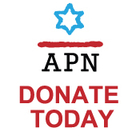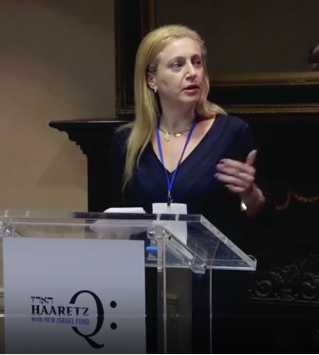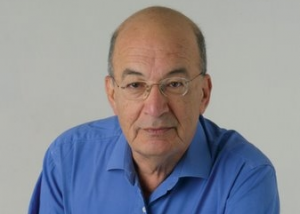This week, Alpher discusses who is the real Reuven Rivlin and how much influence does he wield back home in Jerusalem; does Yossi Cohen's appointment as new head of the Mossad tell us something about the future direction of Israel’s overall security strategy; what will be Cohen’s primary intelligence collection and operational priorities in the Mossad in the years ahead; how can one explain Tehran removing most of its Revolutionary Guards Quds forces from the Syrian battlefield and sending them home to Iran.
One of the many things that Israelis and Palestinians have in common is the role that poetry plays in their popular culture. For both Israelis and Palestinians, poetry is a bridge that connects their personal experience to the national, collective narrative of their people.
 Yehuda Amichai is Israel’s most prominent modern poet, widely considered the country’s poetic
voice of peace. When Yitzhak Rabin was invited to receive the Nobel Peace Prize in 1994, he asked Amichai to
join him and read a couple of poems. One of his selections was his piercing anti-war poem, God has Pity on
Kindergarten Children.
Yehuda Amichai is Israel’s most prominent modern poet, widely considered the country’s poetic
voice of peace. When Yitzhak Rabin was invited to receive the Nobel Peace Prize in 1994, he asked Amichai to
join him and read a couple of poems. One of his selections was his piercing anti-war poem, God has Pity on
Kindergarten Children.
Recently, amidst the recent outbreak of violence in Israel, a restauranteur offered a 50 percent discount on each plate of hummus ordered by Jewish and Arab patrons who dined together. This story went viral. It reminds us that food can bring people together.
 Food brought Yotam Ottolengi and Sami Tamimi together. They are the chefs behind the runaway
bestseller Jerusalem: A Cookbook. It highlights an odd mix of flavors drawing upon recipes indigenous to
Jerusalem. But the truly pleasing odd mix is that Yotam is from West Jerusalem—an Israeli, and Sami is from
East Jerusalem—a Palestinian. They are the best of friends and food is their common bond.
Food brought Yotam Ottolengi and Sami Tamimi together. They are the chefs behind the runaway
bestseller Jerusalem: A Cookbook. It highlights an odd mix of flavors drawing upon recipes indigenous to
Jerusalem. But the truly pleasing odd mix is that Yotam is from West Jerusalem—an Israeli, and Sami is from
East Jerusalem—a Palestinian. They are the best of friends and food is their common bond.
Jews are called “the people of the book” for a reason. Over thousands of years, despite endless persecution, adversity and exile, we have remained a people, linked to one another and our history by our sacred texts, ideologies and teachings. The words in these texts—interpreted anew with each generation—are what binds us together, nourish our Jewish identity, and inspire provocative, mind-expanding (occasionally maddening) discussions in our communities and at our dinner tables.
As it is said: ask two Jews, you’ll get three opinions.
News from Peace Now's (Israel) Settlement Watch:
The main purpose of this declaration is to retroactively legalize construction in the settlement of Karnei Shomron, and to allow it to expand (see photos). Palestinians landowners have already submitted an appeal to the Civil Administration against the declaration. Although the declaration is small in size and is adjacent to an already built area of a settlement, it is still a clear step taken by the Israeli Government which is taking over land and handing it over to the settlers.
We use music in a variety of ways – to teach, to learn, to inspire, to heal. We can use it to help get through life’s troubles or to delve deeply into them.
 Sandy Tolan’s Children of the Stone: The Power of Music in a Hard Land explores many
of these dynamics through the story of Ramzi Aburedwan, a West Bank Palestinian who uses his rare musical
talent to bring the healing power of music to his community in the West Bank. Tolan, the author of the
bestselling book The Lemon Tree, powerfully documents Ramzi’s experiences, from his childhood under
Israeli occupation to becoming a master viola player in the concert halls of Europe to his return to Ramallah
in order to teach and perform.
Sandy Tolan’s Children of the Stone: The Power of Music in a Hard Land explores many
of these dynamics through the story of Ramzi Aburedwan, a West Bank Palestinian who uses his rare musical
talent to bring the healing power of music to his community in the West Bank. Tolan, the author of the
bestselling book The Lemon Tree, powerfully documents Ramzi’s experiences, from his childhood under
Israeli occupation to becoming a master viola player in the concert halls of Europe to his return to Ramallah
in order to teach and perform.
Very few Palestinians have written political memoirs documenting their people’s struggle for statehood and liberty. Sari Nusseibeh’s Once Upon a Country is a rarity and therefore a must-read for anyone seeking to see the conflict through the eyes of a brilliant Palestinian, to comprehend and to empathize.
Yossi Sarid battled against populism and surrendering to public opinion
by Yariv Oppenheimer,
Secretary General of Peace Now
Yossi Sarid (1940 - 2015)
Rare are the leaders who, instead of swimming with the flow, choose the most difficult task of all and work to change its trajectory. Such was Yossi Sarid, a leader who made breakthroughs, who told the truth, who shaped public opinion and did not serve it. A role model, a loud piercing voice, which in times of confusion and dilemmas showed the way for many and served as an ideological compass for many thousands.
We are living in the first era of Jewish independence since the time of the Maccabees. It was over 2000 years ago that Jews last controlled their own destiny before the creation of the modern State of Israel. The independence the Maccabees gained lasted about 80 years. Modern day Israel is 67 years old.
 It was internal divisions and rival factions amongst ourselves that led to the loss of
sovereignty then and we may well be heading in the same direction today.
It was internal divisions and rival factions amongst ourselves that led to the loss of
sovereignty then and we may well be heading in the same direction today.


